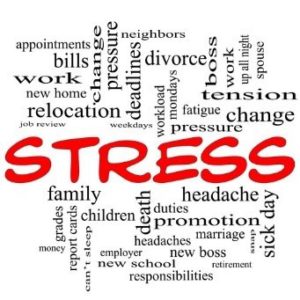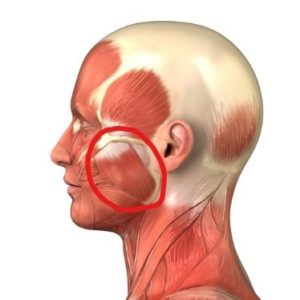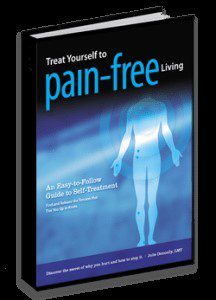Get Rid Of Jaw Pain Forever
Author: Julie Donnelly, LMT – The Pain Relief Expert
Editor: Dr. Steve Chaney
In this article we will show a connection between stress and jaw pain.
 Stress is a part of everyone’s life, but the way you handle it makes a huge difference. People think of stress coming from challenges like divorce, bills, etc., but it can also come from happy situations. Positive life changes such as getting married or having a baby can also cause stress.
Stress is a part of everyone’s life, but the way you handle it makes a huge difference. People think of stress coming from challenges like divorce, bills, etc., but it can also come from happy situations. Positive life changes such as getting married or having a baby can also cause stress.
For some people, the solution to stress is to take a yoga class or practice tai chi regularly. For others, running, exercising, or listening to music eases their mind.
In my Muscular Therapy office, people frequently tell me “I hold my stress in my shoulders,” or “…in my back.” However, a common stress reaction is to clench your teeth tightly. Actually, people hold stress all over their body, from headaches and clenched jaws to foot pain. I want to discuss how clenching your jaws is a common cause of TMJ. Fortunately, it’s a condition that is easy to treat by yourself.
Stress And Jaw Pain
 Jaw pain is commonly caused by a shortening of the masseter muscle. The masseter muscle (circled on graphic) is the muscle that contracts to enable you to chew your food. Normally, as you chew the muscle shortens and then lengthens as you put more food into your mouth. How can stress and jaw pain be related? If you are under stress and your teeth are clenched, you miss the lengthening movement. This imbalance causes the muscle to shorten.
Jaw pain is commonly caused by a shortening of the masseter muscle. The masseter muscle (circled on graphic) is the muscle that contracts to enable you to chew your food. Normally, as you chew the muscle shortens and then lengthens as you put more food into your mouth. How can stress and jaw pain be related? If you are under stress and your teeth are clenched, you miss the lengthening movement. This imbalance causes the muscle to shorten.
Put your fingers on your cheeks so you are pressing into your back teeth. Now, clench your teeth and you’ll feel the muscle bulge. If you clench your teeth when you sleep or you tend to clench your teeth when you are upset, you are setting yourself up for TMJ.
Stress And Jaw Pain (TMJ)
TMJ (Temporomandibular Joint) pain is a condition where your jaw bone rubs or “clicks” over the bone that is just in front of your ear. It is painful, and over time it will damage the bones. When you are under stress and clenching your teeth, you are shortening your masseter muscle. A phenomenon called “muscle memory” will cause the muscle to actually get stuck in the shortened position. The now-shorter muscle prevents you from opening your jaw completely. For example, when you yawn. As you are trying to yawn, your jaw flips over the bone and it hurts.
Several years ago, I had a client who had such tight masseter muscles that a dental surgeon was going to sever them so she could open her mouth. This is a terrible solution because it would mean her mouth would hang open for the rest of her life. Fortunately for this client, she had to get medical approval before she could have the surgery. When Dr. Cohen (the doctor I worked with) felt her masseter muscles, he refused to sign the permission form. He told her that she had to see me first. Fortunately, I was there at the time. It took just 30 minutes for me to release the spasms and teach her how to do the treatment. At the end of the session she was pressing into both masseter muscles and opening her mouth. She did it easily and without pain! She started to cry because she came within one day of having this unnecessary surgery.
Her life was changed by just a simple self-treatment!
Self-Treatment For TMJ Pain
 Here is how to administer TMJ pain relief to yourself. Place your fingers as shown in the picture to the left. Clench your teeth so you can feel the muscles bulge.
Here is how to administer TMJ pain relief to yourself. Place your fingers as shown in the picture to the left. Clench your teeth so you can feel the muscles bulge.
Apply deep pressure on just one side for 5 seconds. Then release that pressure and apply deep pressure to the opposite side for 5 seconds. Go back and forth until it doesn’t hurt anymore. Then find a different “hot spot,” and repeat. Continue doing this until you can’t find any more tender points on your muscle and jaw.
To stretch the masseter muscle, just press deeply into the original point on the muscle  and slowly open your mouth wide.
and slowly open your mouth wide.
Hopefully, you can now see the connection between stress and jaw pain. Stress is a killer, and is the cause for pain all over your body. It’s also important to find the cause of stress and do all that is necessary to resolve it.
My book, “Treat Yourself to Pain-Free Living,” will show you how to self-treat painful spasms throughout your body. Don’t let the pain caused by stress stop you in your tracks. You can become pain-free, and then go and enjoy a yoga class to release stress from your life.
Wishing you well,
Julie Donnelly
About The Author
Julie Donnelly is a Deep Muscle Massage Therapist with 20 years of experience specializing in the treatment of chronic joint pain and sports injuries. She has worked extensively with elite athletes and patients who have been unsuccessful at finding relief through the more conventional therapies.
She has been widely published, both on – and off – line, in magazines, newsletters, and newspapers around the country. She is also often chosen to speak at national conventions, medical schools, and health facilities nationwide.
These statements have not been evaluated by the Food and Drug Administration. This information is not intended to diagnose, treat, cure or prevent any disease.

